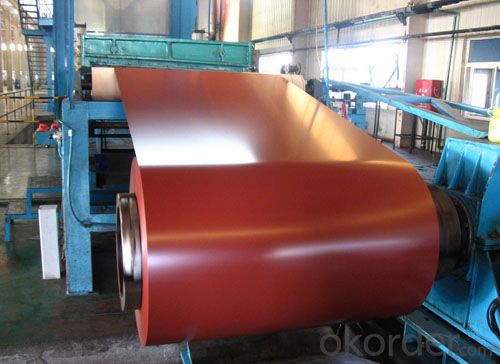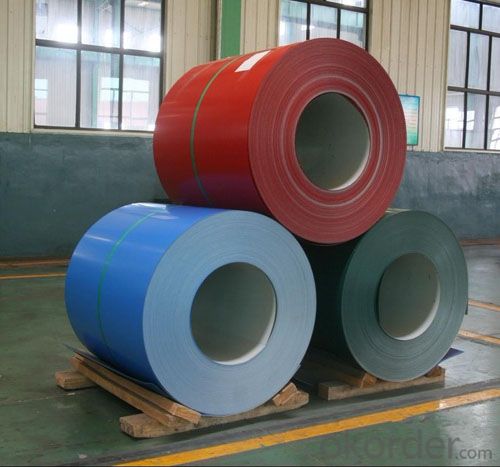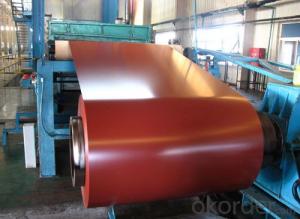Painted Alumnium Coils for Composite Panel Wall Decoration
- Loading Port:
- China main port
- Payment Terms:
- TT OR LC
- Min Order Qty:
- 5 m.t.
- Supply Capability:
- 10000 m.t./month
OKorder Service Pledge
OKorder Financial Service
You Might Also Like
Item specifice
1. Description of Painted Alumnium Coils for Composite Panel Wall Decoration
Alloy: 1050, 1100, 3003, 3005, 3105, etc
Thickness: 0.15mm~1mm
Painting Thickness: 5-10mic for back coating, 15-40mic for top coating
Paint Types: PVDF, PE, HDPE, LDPE, etc
Width: 900mm- 1950mm
Color: According to RAL colors or customer's samples
2. Application of Painted Alumnium Coils for Composite Panel Wall Decoration
(1).Interior: wall cladding, ceilings, bathrooms, kitchens and balconies, shutters, doors...
(2).Exterior: wall cladding, facades, roofing, canopies, tunnels,column covers , renovations...
(3).Advertisement: display platforms, signboards, fascia, shop fronts...
3. Feature of Painted Alumnium Coils for Composite Panel Wall Decoration
*Such coil is specially designed to replace aluminum ingot, due to the high export tax of aluminum ingot, the coil has better price than ingot.
*This type of coil can fit customer's remelting furnace just like ingot, no need to make any change to the production line that was previously used for ingot. The standard coil size and weight is very suitable for the feed gate of furnace.
*This type of coil causes less material wastage than ingot when remelted.
*Our coil is made directly from ore, no need to go though the ingot making process, quality is much better than other suppliers who use ingot scrap to make coil.
Be free from Oil Stain, Dent, Inclusion, Scratches, Stain, Oxide Dicoloration, Breaks, Corrosion, Roll Marks, Dirt Streaks and other defect which will interfere with use
4. Certificate:
SGS and ROHS(if client request, paid by client), MTC(plant provided), Certificate of Origin(FORM A, FORM E, CO), Bureau Veritas and SGS (if client request, paid by client), CIQS certificate
5. Image of Painted Alumnium Coils for Composite Panel Wall Decoration


6. Package and shipping of Painted Alumnium Coils for Composite Panel Wall Decoration
eye to sky
eye to wall
with wooden pallet (wooden case also available)
7. FAQ
1) What is the delivery time?
Dpends on actual order, around 20 days
2) What is the QC system:
We have QC staff of 20 persons and advanced equipment, each production is with MTC traced from Aluminum ingot lot.
3) What market do you mainly sell to?
Australia, America, Asia, Middle East, Western Europe, Africa etc
- Q:Can aluminum coils be used in the construction industry?
- Yes, aluminum coils can be used in the construction industry. Aluminum is a lightweight and durable material with excellent corrosion resistance, making it suitable for various construction applications like roofing, siding, gutters, and HVAC systems. Aluminum coils are commonly used to create custom shapes and profiles that meet specific project requirements.
- Q:What are the common surface finishes for aluminum coils in the electrical industry?
- In the electrical industry, aluminum coils are commonly used for various applications such as transformers, motors, and electrical enclosures. These coils are often subjected to different surface finishing processes to enhance their performance and longevity. One of the most common surface finishes for aluminum coils in the electrical industry is anodizing. Anodizing involves creating a protective oxide layer on the surface of the aluminum through an electrochemical process. This layer not only provides excellent corrosion resistance but also improves the coil's durability and electrical insulation properties. Another popular surface finish is chemical conversion coating, also known as chromate conversion coating. This process involves treating the aluminum surface with a chemical solution to create a thin layer of protective coating. The coating not only provides corrosion resistance but also improves the adhesion of subsequent coatings or paints applied to the coil. Powder coating is another common surface finish used in the electrical industry for aluminum coils. It involves applying a dry powder onto the coil's surface and then curing it under heat to create a durable and attractive finish. Powder coating provides excellent resistance to chipping, scratching, and fading, making it ideal for applications where aesthetics and durability are important. In addition to these surface finishes, aluminum coils in the electrical industry may also undergo other treatments such as lacquering or painting. Lacquering involves applying a clear protective coating to the coil's surface, providing a glossy and protective finish. Painting, on the other hand, involves applying a colored coating to the surface for aesthetic purposes while also providing protection against corrosion. Overall, the choice of surface finish for aluminum coils in the electrical industry depends on the specific requirements of the application. Factors such as corrosion resistance, electrical insulation, durability, and aesthetics play a significant role in determining the most suitable surface finish for a given application.
- Q:Can aluminum coils be used in high-altitude environments?
- Indeed, the utilization of aluminum coils is feasible in high-altitude settings. Thanks to its lightweight and resistance to corrosion, aluminum is a fitting material for various purposes, including in high-altitude scenarios. Aluminum coils are often employed in air conditioning systems, heat exchangers, and refrigeration units, all of which can operate efficiently at high altitudes. The high strength-to-weight ratio of aluminum enables it to endure the harsh conditions encountered at high altitudes, encompassing low temperatures, strong winds, and low atmospheric pressure. Moreover, aluminum is non-magnetic, providing an advantage in specific high-altitude applications like aerospace and satellite technologies. Additionally, aluminum exhibits exceptional thermal conductivity, facilitating efficient heat transfer and rendering it perfect for deployment in cooling systems functioning in high-altitude environments. Its resistance to corrosion also ensures durability and the ability to withstand the impact of moisture, which can be prevalent in such settings. All in all, owing to their lightweight nature, resistance to corrosion, thermal conductivity, and strength, aluminum coils serve as a dependable and appropriate choice for utilization in high-altitude environments.
- Q:Can aluminum coils be used for food processing equipment?
- Food processing equipment can indeed utilize aluminum coils. The reason behind the popularity of aluminum in this context lies in its remarkable thermal conductivity, resistance to corrosion, and lightweight properties. The food industry heavily relies on aluminum for a variety of applications, including heat exchangers, evaporators, and condensers. Specifically engineered to effectively transfer heat and uphold a consistent temperature, aluminum coils prove to be ideal for food processing equipment that demands precise temperature control. Moreover, aluminum is a non-toxic material, guaranteeing that it does not contaminate the processed food. Consequently, aluminum coils establish themselves as a dependable and secure choice for food processing equipment.
- Q:Can aluminum coils be used in the production of aluminum composite ceilings?
- Aluminum composite ceilings can indeed incorporate aluminum coils. The utilization of aluminum coils as the foundational material for manufacturing aluminum composite panels is quite common. These panels, in turn, serve as the foundation for constructing ceilings. The coils themselves typically consist of high-quality aluminum alloy and have undergone numerous processes to guarantee their durability, strength, and visual appeal. For added protection, the aluminum coils are coated with a layer of either PVDF or polyester. This coating serves to enhance their resistance to weathering, UV rays, and corrosion. Additionally, this protective layer allows for a wide array of color options, thus providing ample flexibility in design choices for aluminum composite ceilings. In summary, aluminum coils play a vital role in the production of aluminum composite ceilings. They offer a lightweight, fire-resistant, and long-lasting solution for a variety of architectural and interior design applications.
- Q:Are aluminum coils compatible with different joining methods?
- Yes, aluminum coils are compatible with different joining methods. Some common joining methods for aluminum coils include welding, soldering, brazing, and mechanical fastening. The choice of joining method depends on the specific application and requirements.
- Q:I know this question is not so bright, but I am very curious why do we recycle aluminum cans? Is it that they are not biodegradable?
- Heck yeah. Even an old school, smoke-belching industrialist would recycle *metal*. That's always been true. Why did people suddenly stop recycling metals? Have you PRICED metals lately? Aluminum is over a buck a pound, copper is $3 a pound, steel is over $200 a ton.
- Q:Are aluminum coils suitable for high-temperature roofing applications?
- High-temperature roofing applications are not suitable for aluminum coils. Despite being durable and resistant to corrosion, aluminum has a lower melting point compared to commonly used roofing metals like steel or copper. With a melting point of approximately 660 degrees Celsius (1220 degrees Fahrenheit), aluminum cannot withstand the high temperatures experienced on hot roofs during summer or in areas with high ambient temperatures. Consequently, employing aluminum coils for high-temperature roofing applications may cause the material to warp, distort, or even melt due to the excessive heat, resulting in structural damage and potential leaks. It is recommended to opt for materials with higher melting points, such as steel or copper, for roofing projects where high temperatures are a concern.
- Q:Can aluminum coils be used in the production of beverage cans?
- Yes, aluminum coils can be used in the production of beverage cans. Aluminum coils are commonly used because aluminum is lightweight, corrosion-resistant, and recyclable, making it an ideal material for beverage cans. The coils are typically formed into can bodies and lids, which are then further processed to create the final beverage cans.
- Q:Are there any limitations on the powder coating of aluminum coils?
- Powder coating of aluminum coils has limitations that must be taken into account. To begin with, the thickness and quality of the aluminum coil can affect the powder coating process. If the coil is too thin or of poor quality, it may not withstand the necessary heat for powder coating and could become distorted or damaged. Furthermore, proper surface preparation is essential for successful powder coating. Any contaminants or impurities, such as oils, dirt, or oxides, can hinder the adhesion of the powder coating. Thorough cleaning and pre-treatment of the surface are necessary to achieve a smooth and long-lasting coating. The size and shape of the aluminum coil can also present limitations. Coating complex shapes or intricate designs evenly can be challenging, resulting in variations in coating thickness or coverage. Special techniques or equipment may be required to ensure a uniform and consistent coating. Lastly, the choice of powder coating material can impact the limitations. Some powder coatings may not be suitable for aluminum coils due to chemical compatibility issues or inadequate adhesion properties. It is important to select a powder coating material specifically designed for use on aluminum substrates. In conclusion, while powder coating is a popular and effective method for coating aluminum coils, it is important to consider the limitations. Proper surface preparation, substrate quality, and coating material selection are critical factors in achieving a successful and durable powder coating finish.
1. Manufacturer Overview |
|
|---|---|
| Location | |
| Year Established | |
| Annual Output Value | |
| Main Markets | |
| Company Certifications | |
2. Manufacturer Certificates |
|
|---|---|
| a) Certification Name | |
| Range | |
| Reference | |
| Validity Period | |
3. Manufacturer Capability |
|
|---|---|
| a)Trade Capacity | |
| Nearest Port | |
| Export Percentage | |
| No.of Employees in Trade Department | |
| Language Spoken: | |
| b)Factory Information | |
| Factory Size: | |
| No. of Production Lines | |
| Contract Manufacturing | |
| Product Price Range | |
Send your message to us
Painted Alumnium Coils for Composite Panel Wall Decoration
- Loading Port:
- China main port
- Payment Terms:
- TT OR LC
- Min Order Qty:
- 5 m.t.
- Supply Capability:
- 10000 m.t./month
OKorder Service Pledge
OKorder Financial Service
Similar products
New products
Hot products
Related keywords





























